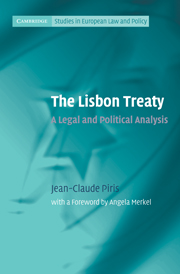Book contents
- Frontmatter
- Contents
- List of boxes
- Foreword by Angela Merkel, Chancellor of the Federal Republic of Germany
- Acknowledgements
- Table of cases
- List of abbreviations
- Introduction
- I The origins and birth of the Lisbon Treaty
- II General provisions
- III Democracy
- IV Fundamental Rights
- V Freedom, Security and Justice
- VI Institutions
- VII External affairs
- VIII Financial, economic, social and other internal affairs
- Conclusion: the Lisbon Treaty and beyond
- Appendixes
- References
- Index
- References
II - General provisions
Published online by Cambridge University Press: 05 June 2012
- Frontmatter
- Contents
- List of boxes
- Foreword by Angela Merkel, Chancellor of the Federal Republic of Germany
- Acknowledgements
- Table of cases
- List of abbreviations
- Introduction
- I The origins and birth of the Lisbon Treaty
- II General provisions
- III Democracy
- IV Fundamental Rights
- V Freedom, Security and Justice
- VI Institutions
- VII External affairs
- VIII Financial, economic, social and other internal affairs
- Conclusion: the Lisbon Treaty and beyond
- Appendixes
- References
- Index
- References
Summary
Values and objectives
One striking characteristic of the Lisbon Treaty is that it is deeply rooted in human rights, as was the case of the failed Constitutional Treaty. As mentioned by an American author, ‘much of the Constitution is given over to the issue of fundamental human rights. It might be said that human rights are the very heart and soul of the document.’
The Lisbon Treaty puts to the forefront the values on which the EU is based (see Box 15). It also takes the highly symbolic steps both of giving the Charter of Fundamental Rights the same legal value as the treaties (Article 6(1) TEU) and of providing for an obligation for the EU to accede to the European Convention for the Protection of Human Rights and Fundamental Freedoms (Article 6(2) TEU).
Box 15. THE UNION'S VALUES (ARTICLE 2 TEU)
The Union is founded on the values of respect for human dignity, freedom, democracy, equality, the rule of law and respect for human rights, including the rights of persons belonging to minorities. These values are common to the Member States in a society in which pluralism, non-discrimination, tolerance, justice, solidarity and equality between women and men prevail.
Article 2 TEU on the Union's values is not only a political and symbolic statement. It has concrete legal effects.
- Type
- Chapter
- Information
- The Lisbon TreatyA Legal and Political Analysis, pp. 71 - 111Publisher: Cambridge University PressPrint publication year: 2010
References
- 1
- Cited by



